
Eduardo Alberto Duhalde is an Argentine former peronist politician who served as the interim President of Argentina from January 2002 to May 2003. He also served as Vice President and Governor of Buenos Aires in the 1990s.

Fernando de la Rúa was an Argentine politician and a member of the Radical Civic Union (UCR) political party who served as President of Argentina from 10 December 1999 to 21 December 2001. De la Rúa was born in Córdoba;he entered politics after graduating with a degree in law. He was elected senator in 1973 and unsuccessfully ran for the office of Vice President as Ricardo Balbín's running mate the same year. He was re-elected senator in 1983 and 1993,and as deputy in 1991. He unsuccessfully opposed the pact of Olivos between President Carlos Menem and party leader Raúl Alfonsín,which enabled the 1994 amendment of the Argentine Constitution and the re-election of Menem in 1995.

Raúl Ricardo Alfonsín was an Argentine lawyer and statesman who served as President of Argentina from 10 December 1983 to 8 July 1989. He was the first democratically elected president after the 7-years National Reorganization Process. Ideologically,he identified as a radical and a social democrat,serving as the leader of the Radical Civic Union from 1983 to 1991,1993 to 1995,1999 to 2001,with his political approach being known as "Alfonsinism".
The Olivos Pact refers to a series of documents signed on 17 November 1993,between the governing President of Argentina,Carlos Menem,and former President and leader of the opposition UCR,Raúl Alfonsín,that formed the basis of the constitutional reform of 1994. These memorandum of understanding were signed in the official presidential residence,the Quinta de Olivos.
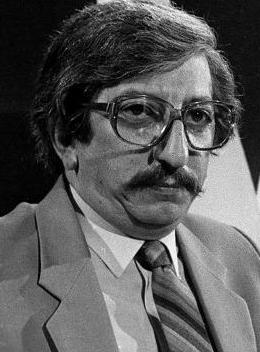
Dante Caputo was an Argentine academic,diplomat and politician,who served as the nation's foreign minister under President Raúl Alfonsín.

The Argentine general election of 1995 was held on 14 May. Voters chose both the President and their legislators and with a turnout of 82.1%.

Lidia Elsa Satragno was an Argentine actress and politician,where she was popularly known as Pinky.

César Jaroslavsky was an Argentine politician prominent in the UCR,the country's oldest existing political party.

Ricardo Luis Alfonsín is an Argentine lawyer,academic and politician prominent in the Radical Civic Union. His father,Raúl Alfonsín,was the President of Argentina from 1983 to 1989. Since 2019,he has been Argentina's ambassador to Spain.

General elections were held in Argentina on Sunday,23 October 2011. Incumbent president Cristina Fernández de Kirchner of the Front for Victory won in a landslide,with 54.11% of the vote,securing a second term in office. The Front for Victory won just over half of the seats in the National Congress. As of 2023,this marked the last time the vice president-elect wasn't a female.

Ricardo Gil Lavedra is an Argentine lawyer,magistrate,and politician. A member of the Radical Civic Union,Gil Lavedra served as Minister of Justice during the early presidency of Fernando de la Rúa,from 1999 to 2000. From 2009 to 2013,he was a member of the Argentine Chamber of Deputies elected in Buenos Aires.
Rafael Oscar Rabanal was an Argentine writer and journalist,managing editor and columnist in various Argentine and foreign media.
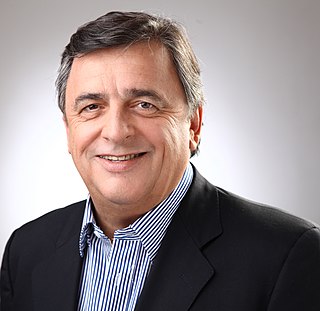
Mario Raúl Negri is an Argentine Radical Civic Union (UCR) politician and lawyer. He was a National Deputy for Córdoba Province from 2011 to 2023,leading the UCR parliamentary bloc during most of his tenure. In addition,he was a member of the Council of Magistracy appointed by the Chamber of Deputies from 2017 to 2018.

Fernando Nadra was an Argentine lawyer,journalist and public speaker. He was one of the most important leaders of the Partido Comunista Argentino and,from his Marxist ideological perspective,took part in most of the important political debates of his time. He stood out from other left-wing leaders of his time for his abilities as an organizer and collective activist,and his numerous attempts to promote agreement among different political sectors through pluralistic dialogue.
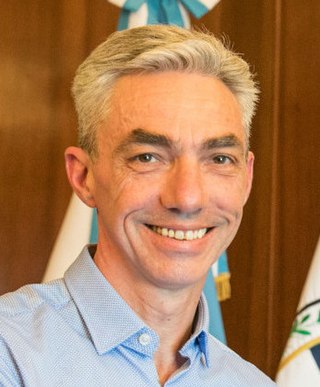
Mario Andrés Meoni was an Argentine politician who served as Minister of Transport from 2019 until his death in 2021. He had previously served as intendente (mayor) of Junín,a partido in Buenos Aires Province,from 2003 to 2015.

Leopoldo Raúl Guido Moreau is an Argentine journalist and politician. A prominent member of the Radical Civic Union throughout most of his career,Moreau later aligned himself with the administration of former president Cristina Fernández de Kirchner,breaking with his party,founding the National Alfonsinist Movement and becoming one of the most prominent Radicales K.
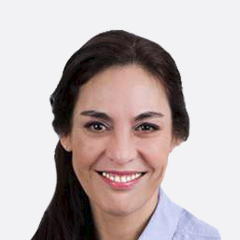
Ana Carla Carrizo is an Argentine political scientist and politician,currently serving as National Deputy elected in the City of Buenos Aires since 2013. She is a member of the Radical Civic Union (UCR).

Facundo Ernesto Suárez Lastra is the Argentine politician of the Radical Civic Union. Suárez Lastra has held a number of important positions throughout his career;most notably,he was intendente (mayor) of Buenos Aires from 1987 to 1989,during the presidency of Raúl Alfonsín. From 2017 to 2021,he was a National Deputy elected in the Federal Capital.

Emiliano Benjamín Yacobitti is an Argentine politician. He is a member of the Radical Civic Union (UCR),and served as the Buenos Aires City UCR Committee from 2013 to 2017. From 2019 to 2023,he was a National Deputy elected in the City of Buenos Aires.
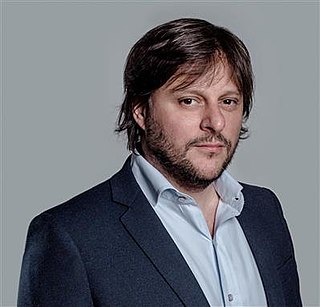
Leandro Santoro is an Argentine political scientist,professor and politician,currently serving as a National Deputy since 2021. Santoro previously served as a member of the Buenos Aires City Legislature from 2017 to 2021.




















